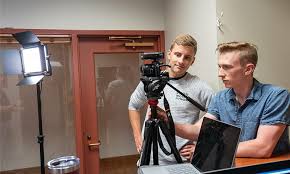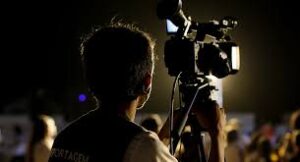Reasons To Hire A Corporate Videographer To Film Your Event
If your business has a big corporate event coming up now is the time to take the steps to ensure you capture the entire event on video. If you haven’t considered hiring a corporate event filming team, you’re certainly missing out on a lot of missed opportunity. Event video coverage is about more than just capturing the daily happenings on stage. This is a way for you to build awareness for your brand, keep people engaged and interested in your business, and share what’s happening at you company for many months after the big event. These are just a few of the major reasons that you should consider hiring a corporate videographer to film your corporate event.
- Professional Footage Reflects The Quality Of Your Business
You wouldn’t produce a sloppy graphic to share on social media or on your website would you? The same is true when it comes to capturing your event on video–only the best footage will do! A professional corporate event film crew has the skills to capture your main event with style and in a way that someone just starting out in the field or learning about video production simply wouldn’t be able to deliver.
You want your event to appear as professional as your business. You don’t want some random employee filming from their iPhone and calling it a day. Professional corporate event filming services show your customers and potential customers that you mean business.
- Professional Event Videographers Respect Your Space
Of course you want close ups of the keynote speakers and you want to capture all those intricate moments to the best of your ability, but Joe from IT isn’t going to capture all of that footage with the same demeanor that a professional would. Joe is going to be in the way and he’s probably going to make a lot of mistakes and his filming will be borderline intrusive to the speakers on your stage–you certainly don’t want Joe recording your event!
A professional videographer knows how to capture your corporate event eloquently and without interrupting the activities taking place. And, since there will be limited disruption, attendees and all those being filmed will act more natural because they won’t even realize the cameras are rolling in many cases.
- Professional Cinematographers Have Professional Editors Too
If you hire a corporate videographer then you can almost guarantee that your event footage will pass through a rigorous editing process in order to appropriately coordinate the footage of your event into a seamless production that is worthy of your desire to share it. However, if you hire Sally from HR to capture the highlights from her iPhone, chances are you’ll wind up with a bunch of half-captured moments in several files that will in no-way come together as a seamless rendition of your event. Is that what you want?
- Professional Video Shares Your Event Story
How do you capture the eyes of a vast audience and keep them engaged and ready for every last minute of your video? You tell a story! Professional event videographers realize the need to conceptualize the video footage that they capture so that it can all be edited in a way that allows the footage to tell the story of your event. Corporate videographers use emotion, connection and a creative approach to bring your event to life on camera. You want to share your story with the world don’t you?
- Professionals Follow Production Timelines
Finally, hiring a corporate videographer to capture your big event on camera is about getting the work finished in a timely manner. Professional videographers and event filming services realize that the sooner you have your footage back, the sooner you can put the film to work for your brand. Your video production team will have a production timeline that is laid out prior to your contract being signed and you’ll know exactly when to expect your finished footage to be prepared.
While you may have time to wait for the footage, think of how much opportunity is lost when you are waiting around for the final files instead of sharing them on social media, your website, and in your marketing and promotional materials. Hiring a professional videographer ensures delivery of your event video on time.

Three Different Types Of Videographers; Here’s How To Spot Them.
#1 The Novice
This is the new person who just bought a camera and a little bit of equipment. This person has a burning desire to be the best videographer and practice their craft, but doesn’t have the knowledge or the skills. He or she would be new to the business and may not have a show reel or other work they can show you. Although some of these people are stars in the making, you may not have the time to shoot your footage twice or be able to deal with the mistakes. To make sure you’re not dealing with a novice, ask this key question: “Can I see your work?” If you don’t see at least 20 videos, this may be a Novice.
#2 The Videographer
This person has been around a while, and has made some mistakes. You can feel lucky that the mistakes have been made on other people’s projects, and the chances of this person making a mistake on your project is pretty remote. This person has been in the business for at least five years, has seen many different scenarios, and isn’t afraid to speak up when they see something wrong. Videographers are comfortable talking about their work and are not afraid to show it. Their key skills in composition, depth of field, and location selection are second nature to them. The key to hiring this individual is finding the one who may not know his or her value yet. There are many of these folks out there—you just have to do some hunting to find them.
#3 The Cinematographer/Director
The Cinematographer has all of the skills listed above. The Cinematographer is the type of person who isn’t afraid to engage you about your message or story and really dig into your product and audience. This person wants to give you direction and will pay attention to details including what you are wearing, background, foreground, and anything that may mess up the shot. The Cinematographer is worried that you may make the final product look bad based on poor customer choices. This person will have a portfolio that will take you days to get through, and you should see at least two different genres of work. The Cinematographer/Director is worth the price if you have the budget. This is the person who may save you money by creating a video that converts pedestrians into customers.

Essential Qualities of a Good Videographer
- Having Great Communication Skills
A good videographer will have great communication skills and be a leader both on and off the set. When filming a project, having a good line of communication is a must. A breakdown in this communication leads to issues behind the camera. A videographer who has great communication skills will be able to not only communicate with anyone helping them, but they will also be able to communicate clearly with their client to ensure that both parties are on the same page. If a videographer is not sure about what their client wants, they should always inquire before moving forward with the project.
- Having Knowledge of All Types of Video Equipment
There are a large variety of video cameras, editing software, lighting rigs, etc. A good videographer will have basic knowledge of how all these pieces of equipment work, especially if they are going solo on a project. Having access to mid to upper range equipment is also a must. They will also have knowledge of basic lighting setups, white-balance levels, and camera movement. All these elements (and many others) put together will help create a great final cut.
- Being Able to Adapt to Any Situation
Being a videographer also means that you have to adapt to what is happening around you, especially if you are filming a live event where you only get one chance to get it right. Everything doesn’t always go according to plan, and you have to able to adjust for that. Quick thinking and fast-acting are the difference between a perfect shot and a missed opportunity.

Videographer Skills and Qualifications
Videographers have a good eye for detail and beauty. They use their skills to tell visual stories with video and audio recorded during various events. Employers and individuals who hire videographers seek out professionals who have the following specific skills:
- Computer skills – videographers need good computer skills to work with various video editing software programs, such as Adobe, Cinema 4D, and Photoshop
- Interpersonal skills – videographers use excellent interpersonal skills to work with people of all ages from all walks of life, helping them feel relaxed and comfortable in front of the camera
- Time management – videographers use time management skills to work within tight deadlines, capturing action and once-in-a-lifetime moments on camera
- Multitasking – because videographers capture many different moments, people, and expressions on camera, employers look for professionals with multitasking skills to fill this role
- Communication skills – videographers provide direction to capture the right moments on camera, which requires good verbal communication skills
- Physical fitness – it takes physical fitness for videographers to transport, move, set up, and take down various pieces of heavy recording equipment
- Attention to detail – videographers use keen attention to detail to make precise edits to captured video and stage beautiful scenes for filming purposes
A simple video assignment for the interview process
What videographer interview would be complete without actually seeing what the candidate is capable of?
hat’s where the practical video assignment comes in. By this point, your candidate has probably ‘talked the talk’ during the interview process but now let’s see if they can ‘walk the walk’ by actually creating a video.
This assignment not only shows you the candidate’s video skills, it will also tell you a lot about their time management, creativity, critical thinking and communication skills.
Here’s what you should ask them to do:
- Have your videographer candidates make a video explaining why they want the job. This will give you an idea of how good they are at telling a story. Also, how they present themselves could give you an idea of how well they understand your brand.
- Give a certain timeframe to complete the video (2-5 days). This shows how well they do under a time constraint, how fast they are able to turnaround content, and how creative they can be under pressure.
- Have them develop a script or storyboard to accompany the video. This shows their creative process beyond the cameras and lights. Many times this is what they’ll be presenting when they start a new project. How prepared can they be?
- Allow them to be creative, and think outside the scope of a Traditional Marketing video. Let them know that they are free to tell the story as they wish to tell it, so be creative and have fun with it.
Once you’ve received their video, use the criteria from earlier in this article to gauge their skill levels, personality, and creativity.
Did they do the bare minimum or go above and beyond? Did they seem to struggle to complete the task or did they push their boundaries?